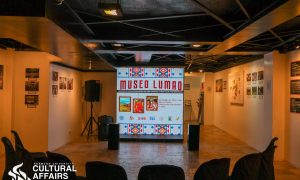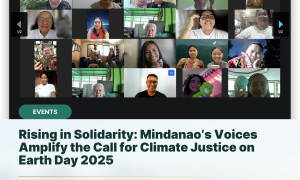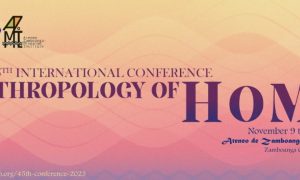July 19, 2025 — Eight years after the siege of Marawi, the city’s memory returned not with the sound of gunfire, but with voices filled with grief, defiance, and hope. In the online gathering titled “Kabnar sa Marawi: Reclaiming Justice, Rebuilding Lives,” Meranaw leaders, survivors, students, advocates, and allies came together to confront the silence that has settled over the Philippines’ only Islamic city.
Held just days before President Ferdinand Marcos Jr.’s State of the Nation Address (SONA), the event served as both commemoration and protest. Co-organized by Mindanao Climate Justice (MCJ), Panaad Network, and the Kinaiyahan Youth Network, the gathering stood in solidarity with displaced Meranaw communities, challenged the ongoing erasure of Marawi from national discourse, and renewed urgent calls for justice.
At the heart of the discussion was a painful truth: while the government promotes its “Bagong Marawi” through high-profile infrastructure projects, thousands of internally displaced persons (IDPs) remain in limbo—unable to return to their homes with dignity. Behind the newly built grandstands and roads lies a deeper devastation: displacement without consent, consultation, or compensation.
Moro Leaders Speak Truth to Power
Two leading Moro voices anchored the conversation: Drieza Lininding, Chairperson of the Moro Consensus Group, and Sultan Hamidullah Atar, Sultan of Marawi and Executive Officer of Reconciliatory Initiatives for Development Opportunities Inc.
Lininding delivered a powerful critique of the government’s so-called rehabilitation. “Marawi’s recovery is not just about rebuilding structures—it’s about restoring dignity and rights to its people,” he asserted, calling out the lack of transparency, community consultation, and reparation.
This call for truth was further amplified through the screening of Kambalingan, a short documentary produced by MSU students and IDEALS Inc., chronicling the stories of IDPs still yearning to return. The film offered a glimpse into lives suspended between broken promises and lingering trauma.
Sultan Atar followed with a searing account of abandonment:
“Even before the bombs fell, 69% of our population lived in poverty. Now, we’ve lost our homes, schools, mosques, and businesses—and we’re told to be grateful for projects that do not serve us.”
He demanded accountability for the excessive use of force during the siege and questioned why compensation remains out of reach.
“There can be no ‘Bagong Marawi’ if we are not allowed to return home with dignity.”
Drawing parallels to the Palestinian experience, Atar shared a personal act of resistance: he refuses to sleep in Marawi until he can rebuild his own home.
“Rehabilitation has never been inclusive. It disrespects the rights and dignity of those most affected. To this day, many families cannot even bury their dead with dignity.”
Solidarity Across Generations and Borders
Reactors from across sectors deepened the conversation. Peter Murphy, Chairperson of the Global Council of the International Coalition for Human Rights in the Philippines (ICHRP), offered a strong message of solidarity from international civil society. He emphasized that Marawi’s story reflects a global pattern of militarized responses to conflict and development.
“The world is watching,” he said. “We must act—not just with sympathy, but with solidarity and pressure.” Murphy also called out the enabling roles of governments such as the United States, Australia, and Japan, and reaffirmed ICHRP’s support for the full implementation of the Marawi Siege Victims Compensation Law.
From the youth sector, Nurainie Rakim, Co-Chairperson of Kinaiyahan Youth Network, delivered a stirring closing message:
“As young people shaped by this struggle, we refuse to inherit silence. Justice for Marawi is a generational responsibility.”
Justice Beyond Grandstands
More than just a webinar, Kabnar sa Marawi was a declaration: that the struggle for justice cannot be reduced to ribbon-cutting ceremonies or silenced by military checkpoints. The demands were clear: implement the Marawi Compensation Law, demilitarize civilian spaces, and enable the dignified return of all displaced families.
As the event drew to a close, one message resonated in every testimony:
Marawi is not gone.
It lives in every story shared, in every demand for return, in every act of remembrance and resistance.
It is not just a memory—it is a living struggle.




